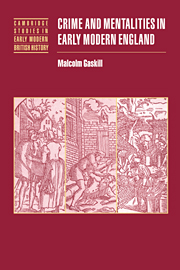7 - Murder: police, prosecution and proof
from Part III - Murder
Published online by Cambridge University Press: 05 July 2012
Summary
The principle that it is in the interest both of individuals and the community that all cases of unexpected death should be investigated has been approved by all civilized societies.
Radzinowicz, preface to Havard, The detection of secret homicide, p. viiAmateur office-holding and voluntary prosecution, supported by state majesty and divine providence, were the keystones of accusatory justice in early modern England. Even where murders were concerned, the process of apprehending and committing suspects depended on people passing information to unpaid, untrained law officers, or what together they gleaned from pre-trial investigations conducted informally in the community. Although these procedures could be highly efficient, from the later seventeenth century the power of providence as an ideological prop was diminishing; the sacred was 'no longer regarded as a workable means of effectively ordering the profane world', and instead men began to find new ways to solve the problems which they themselves - as opposed to the devil or any other supernatural agency - were responsible for causing. Associated with this was increasing judicial insistence on higher evidential standards to prove murder at law, a requirement which called for more thorough investigative methods. Relying on communities to provide testimony which was symbolic, subjective and suggestive (rather than factual, objective and conclusive) became less acceptable. This change, though undramatic even by the end of the period, paved the way for the development of detective policing and the routine presentation of forensic medical evidence by expert witnesses in the nineteenth century. The seeds of secularization and professionalization had been sown.
- Type
- Chapter
- Information
- Crime and Mentalities in Early Modern England , pp. 242 - 280Publisher: Cambridge University PressPrint publication year: 2000



